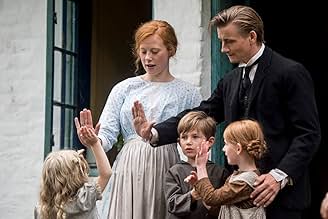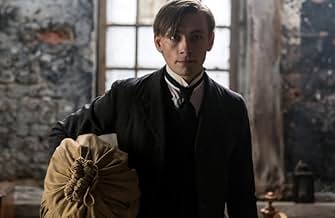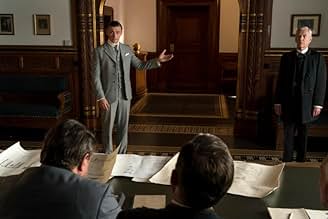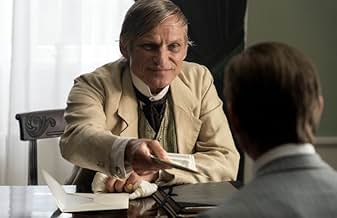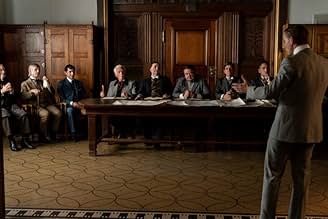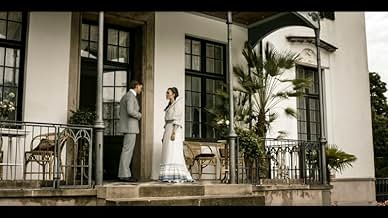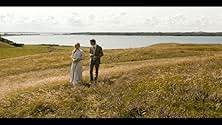Un ingénieur doué fuit ses racines austères pour rechercher la richesse et le succès parmi l'élite de Copenhague, mais la fierté qui le propulse menace d'être sa ruine.Un ingénieur doué fuit ses racines austères pour rechercher la richesse et le succès parmi l'élite de Copenhague, mais la fierté qui le propulse menace d'être sa ruine.Un ingénieur doué fuit ses racines austères pour rechercher la richesse et le succès parmi l'élite de Copenhague, mais la fierté qui le propulse menace d'être sa ruine.
- Réalisation
- Scénario
- Casting principal
- Récompenses
- 5 victoires et 13 nominations au total
Sara Viktoria Bjerregaard
- Inger
- (as Sara Viktoria Bjerregaard Christensen)
Avis à la une
This movie is Long, and it feels Long. But it uses that, it takes it's time and establishes wellwritten and charismatic characters that you emotionally engage in.
It has aome beautiful set design and costumes are on point. The actors do a very good job, including the lead who has a striking ressemblence to Martin Freeman.
Overall a wellrounded and satisfying film, good to watch with a group of people where you can discuss the plot as the movie Rolls along.
It has aome beautiful set design and costumes are on point. The actors do a very good job, including the lead who has a striking ressemblence to Martin Freeman.
Overall a wellrounded and satisfying film, good to watch with a group of people where you can discuss the plot as the movie Rolls along.
What an incredibly moving film by Bille August. The director thankfully takes his time telling us the story of a man trying to break free from the conventions of his time as well as his social and cultural boundaries and yet finding himself more chained to them with every step he takes to try and get away from them.
The two lead characters are spellbindingly good.
I felt truly sad and nostalgic when the film ended. The characters stayed with me for a long time and I will certainly want to watch this film again.
I watched it in the original Danish version with subtitles.
The two lead characters are spellbindingly good.
I felt truly sad and nostalgic when the film ended. The characters stayed with me for a long time and I will certainly want to watch this film again.
I watched it in the original Danish version with subtitles.
10alrodbel
Often a prosaic formulaic film can be a financial success based on casting and marketing decisions that provide anticipation of the release. Having viewed this just by chance last night on Netflix (not dubbed, as commenters have criticized) the film combined a rare and intriguing immersion of a different time and place.
Few films are made from Nobel Literature Prize winning novels, as this described by the prize winner Henrik Pontoppidan in 1917. "But the subjects which especially attracted me demanded a more spacious form and a broader style. I turned to the novel, an artistic form which had in former days been neglected and had thus acquired a bad reputation, but which during the nineteenth century had developed and elevated itself to the ranks occupied by drama and the ancient epic. In a trilogy, including Lykke Per written over a decade period, I have attempted to give a continuous picture of the Denmark of today through descriptions of human minds and human fates which reflect the social, religious, and political struggles of the time.
Rather than being unduly slow moving, this film conveyed the life of several strong willed characters along with an accurate depiction of two cultures of the era - fundamentalist Christianity and Secular Judaism. The three hours of the film could only define the contours of the radical Christianity, while dramatizing the cultural-financial-humanistic world of this class of Jews, that also illustrates this same group in neighboring Germany.
The film brilliantly depicted the era on two levels, a brilliant man who bristled under this form of Christianity; and his lover who was part of the vanguard of enlightened humanist sensibilities, soon to be destroy by the disaster of the Third Reich.
The acclaim by other commenters who saw the Danish language version, indicates this film should have been an artistic and financial success. As produced, it is a rare gem, that fulfills the original writers goal of capturing a time of transition in Denmark, and of Europe
Few films are made from Nobel Literature Prize winning novels, as this described by the prize winner Henrik Pontoppidan in 1917. "But the subjects which especially attracted me demanded a more spacious form and a broader style. I turned to the novel, an artistic form which had in former days been neglected and had thus acquired a bad reputation, but which during the nineteenth century had developed and elevated itself to the ranks occupied by drama and the ancient epic. In a trilogy, including Lykke Per written over a decade period, I have attempted to give a continuous picture of the Denmark of today through descriptions of human minds and human fates which reflect the social, religious, and political struggles of the time.
Rather than being unduly slow moving, this film conveyed the life of several strong willed characters along with an accurate depiction of two cultures of the era - fundamentalist Christianity and Secular Judaism. The three hours of the film could only define the contours of the radical Christianity, while dramatizing the cultural-financial-humanistic world of this class of Jews, that also illustrates this same group in neighboring Germany.
The film brilliantly depicted the era on two levels, a brilliant man who bristled under this form of Christianity; and his lover who was part of the vanguard of enlightened humanist sensibilities, soon to be destroy by the disaster of the Third Reich.
The acclaim by other commenters who saw the Danish language version, indicates this film should have been an artistic and financial success. As produced, it is a rare gem, that fulfills the original writers goal of capturing a time of transition in Denmark, and of Europe
If you choose to watch a foreign language film dubbed into your language, you are not watching the work as created by the actors and director. If you are too ignorant to read subtitles you have no right to review.
Last night I had the pleasure of enjoying this movie at the East Bay Jewish Film Festival, in Northern California, USA. It appears that the 3 people who have previously reviewed this movie are from Denmark, so they have a different perspective than someone from my part of the world.
What is very confusing is that when you search for this movie it comes up on imdb as BOTH a mini series and also a movie. It was interesting last night, when they told us, that there was an intermission. Now I know why. I also understand and agree with the other viewers that it is too long and too slow. But if it was originally designed as a mini series, things generally get stretched out.
However, I found it to be a very interesting movie. What was not made clear was whether it was based on a true story or not? If it was, I would have wanted to know if any of his engineering ideas were ever adapted in any way for Denmark or some of the projects that the Jewish family sponsored at the end of the movie stayed in existence for a long time or not.
The cinematography was fascinating and perhaps understanding the difference between people in the big city of Copenhagen as opposed to Jutland would have been nice. Anyway, I liked it.
What is very confusing is that when you search for this movie it comes up on imdb as BOTH a mini series and also a movie. It was interesting last night, when they told us, that there was an intermission. Now I know why. I also understand and agree with the other viewers that it is too long and too slow. But if it was originally designed as a mini series, things generally get stretched out.
However, I found it to be a very interesting movie. What was not made clear was whether it was based on a true story or not? If it was, I would have wanted to know if any of his engineering ideas were ever adapted in any way for Denmark or some of the projects that the Jewish family sponsored at the end of the movie stayed in existence for a long time or not.
The cinematography was fascinating and perhaps understanding the difference between people in the big city of Copenhagen as opposed to Jutland would have been nice. Anyway, I liked it.
Le saviez-vous
- AnecdotesThe Danish author of 'Lykke-Per', Henrik Pontoppidan, was awarded the Nobel Prize in literature 1917.
- ConnexionsEdited into Lykke-Per (2018)
Meilleurs choix
Connectez-vous pour évaluer et suivre la liste de favoris afin de recevoir des recommandations personnalisées
- How long is A Fortunate Man?Alimenté par Alexa
Détails
Box-office
- Budget
- 55 000 000 DKK (estimé)
- Durée2 heures 42 minutes
- Couleur
- Rapport de forme
- 1.85 : 1
Contribuer à cette page
Suggérer une modification ou ajouter du contenu manquant



